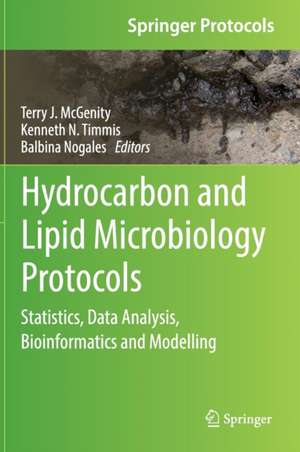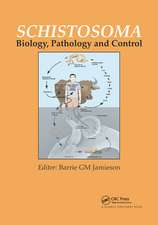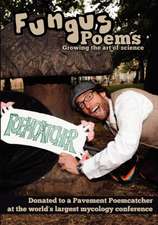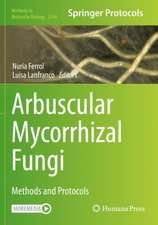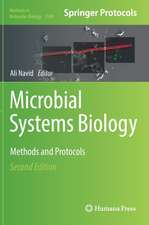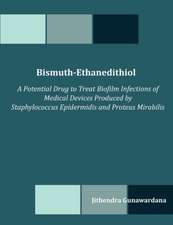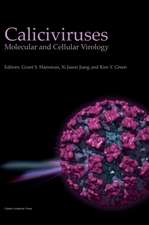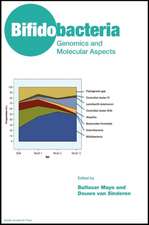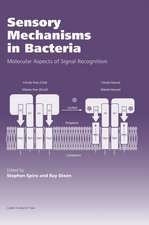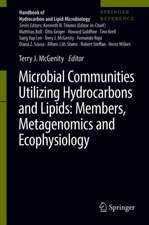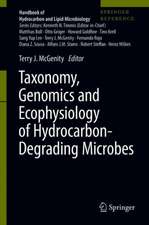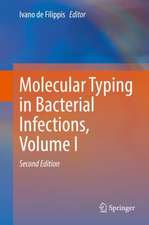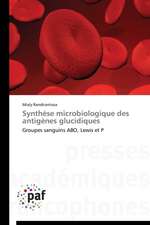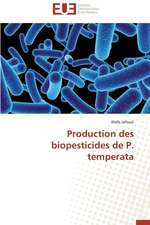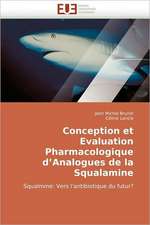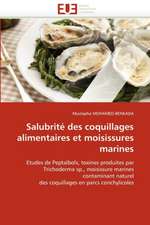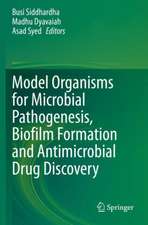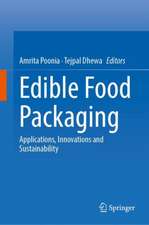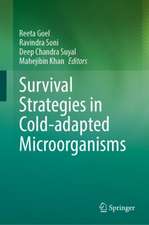Hydrocarbon and Lipid Microbiology Protocols: Statistics, Data Analysis, Bioinformatics and Modelling: Springer Protocols Handbooks
Editat de Terry J. McGenity, Kenneth N. Timmis, Balbina Nogales Fernándezen Limba Engleză Hardback – 19 aug 2016
Hydrocarbon and Lipid Microbiology Protocols
There are tens of thousands of structurally different hydrocarbons, hydrocarbon derivatives and lipids, and a wide array of these molecules are required for cells to function. The global hydrocarbon cycle, which is largely driven by microorganisms, has a major impact on our environment and climate. Microbes are responsible for cleaning up the environmental pollution caused by the exploitation of hydrocarbon reservoirs and will also be pivotal in reducing our reliance on fossil fuels by providing biofuels, plastics and industrial chemicals. Gaining an understanding of the relevant functions of the wide rangeof microbes that produce, consume and modify hydrocarbons and related compounds will be key to responding to these challenges. This comprehensive collection of current and emerging protocols will facilitate acquisition of this understanding and exploitation of useful activities of such microbes.
| Toate formatele și edițiile | Preț | Express |
|---|---|---|
| Paperback (2) | 635.01 lei 6-8 săpt. | |
| Springer Berlin, Heidelberg – 15 iun 2018 | 635.01 lei 6-8 săpt. | |
| Springer Berlin, Heidelberg – 15 iun 2018 | 637.78 lei 6-8 săpt. | |
| Hardback (2) | 642.51 lei 6-8 săpt. | |
| Springer Berlin, Heidelberg – 19 aug 2016 | 642.51 lei 6-8 săpt. | |
| Springer Berlin, Heidelberg – 19 aug 2016 | 645.47 lei 6-8 săpt. |
Din seria Springer Protocols Handbooks
- 18%
 Preț: 782.42 lei
Preț: 782.42 lei - 5%
 Preț: 1817.13 lei
Preț: 1817.13 lei - 18%
 Preț: 1120.18 lei
Preț: 1120.18 lei -
 Preț: 403.91 lei
Preț: 403.91 lei - 15%
 Preț: 662.30 lei
Preț: 662.30 lei - 18%
 Preț: 1855.11 lei
Preț: 1855.11 lei - 18%
 Preț: 1918.09 lei
Preț: 1918.09 lei - 18%
 Preț: 896.08 lei
Preț: 896.08 lei - 15%
 Preț: 644.82 lei
Preț: 644.82 lei - 20%
 Preț: 593.48 lei
Preț: 593.48 lei - 18%
 Preț: 966.27 lei
Preț: 966.27 lei - 5%
 Preț: 2329.29 lei
Preț: 2329.29 lei - 18%
 Preț: 952.09 lei
Preț: 952.09 lei - 5%
 Preț: 737.11 lei
Preț: 737.11 lei - 15%
 Preț: 648.24 lei
Preț: 648.24 lei - 18%
 Preț: 984.44 lei
Preț: 984.44 lei - 18%
 Preț: 977.34 lei
Preț: 977.34 lei - 18%
 Preț: 1674.20 lei
Preț: 1674.20 lei - 18%
 Preț: 1841.06 lei
Preț: 1841.06 lei - 18%
 Preț: 970.87 lei
Preț: 970.87 lei - 18%
 Preț: 1588.19 lei
Preț: 1588.19 lei - 18%
 Preț: 1029.13 lei
Preț: 1029.13 lei - 5%
 Preț: 677.07 lei
Preț: 677.07 lei - 18%
 Preț: 1250.74 lei
Preț: 1250.74 lei - 5%
 Preț: 723.78 lei
Preț: 723.78 lei - 18%
 Preț: 900.18 lei
Preț: 900.18 lei - 18%
 Preț: 800.55 lei
Preț: 800.55 lei - 15%
 Preț: 645.60 lei
Preț: 645.60 lei - 5%
 Preț: 1487.03 lei
Preț: 1487.03 lei
Preț: 645.47 lei
Preț vechi: 759.37 lei
-15% Nou
Puncte Express: 968
Preț estimativ în valută:
123.51€ • 132.08$ • 102.98£
123.51€ • 132.08$ • 102.98£
Carte tipărită la comandă
Livrare economică 18 aprilie-02 mai
Preluare comenzi: 021 569.72.76
Specificații
ISBN-13: 9783662493090
ISBN-10: 3662493098
Pagini: 192
Ilustrații: XII, 180 p.
Dimensiuni: 178 x 254 x 13 mm
Greutate: 0.56 kg
Ediția:1st ed. 2016
Editura: Springer Berlin, Heidelberg
Colecția Springer
Seria Springer Protocols Handbooks
Locul publicării:Berlin, Heidelberg, Germany
ISBN-10: 3662493098
Pagini: 192
Ilustrații: XII, 180 p.
Dimensiuni: 178 x 254 x 13 mm
Greutate: 0.56 kg
Ediția:1st ed. 2016
Editura: Springer Berlin, Heidelberg
Colecția Springer
Seria Springer Protocols Handbooks
Locul publicării:Berlin, Heidelberg, Germany
Cuprins
Introduction to computer-assisted analysis in lipid and hydrocarbon microbiology.- Application of Ecological Network Theory.- Statistical tools for data analysis.- Statistical tools for study design and replication.- MG-RAST, a metagenomics service for analysis of microbial community structure and function.- Using QIIME to evaluate the microbial communities within hydrocarbon environments.- Biodegradation Prediction Tools.- Predicting protein interactions.- Syntax and Semantics of Coding in Python.- Protocols for calculating reaction kinetics and thermodynamics.- Modelling the environmental fate of hydrocarbons during bioremediation.
Textul de pe ultima copertă
This Volume covers protocols for in-silico approaches to hydrocarbon microbiology, including the selection and use of appropriate statistical tools for experimental design replication, data analysis, and computer-assisted approaches to data storage, management and utilisation. The application of algorithms to analyse the composition and function of microbial communities is presented, as are prediction tools for biodegradation and protein interactions. The basics of a major open-source programming language, Python, are explained. Protocols for calculating reaction kinetics and thermodynamics are presented, and modelling the environmental fate of hydrocarbons during bioremediation is explained. With the exception of molecular biology studies of molecular interactions, the use of statistics is absolutely essential for both experimental design and data analysis in microbiological research, and indeed in the biomedical sciences in general. Moreover, studies of highly varying systems call for the modelling and/or application of theoretical frameworks. Thus, while two protocols in this Volume are specific to hydrocarbon microbiology, the others are generic, and as such will be of use to researchers investigating a broad range of topics in microbiology and the biomedical sciences in general.
Hydrocarbon and Lipid Microbiology Protocols
There are tens of thousands of structurally different hydrocarbons, hydrocarbon derivatives and lipids, and a wide array of these molecules are required for cells to function. The global hydrocarbon cycle, which is largely driven by microorganisms, has a major impact on our environment and climate. Microbes are responsible for cleaning up the environmental pollution caused by the exploitation of hydrocarbon reservoirs and will also be pivotal in reducing our reliance on fossil fuels by providing biofuels, plastics and industrial chemicals. Gaining an understanding of the relevant functions of the widerange of microbes that produce, consume and modify hydrocarbons and related compounds will be key to responding to these challenges. This comprehensive collection of current and emerging protocols will facilitate acquisition of this understanding and exploitation of useful activities of such microbes.
Caracteristici
Offers readily reproducible, step-by-step laboratory methods Provides helpful tips and tricks to complement the protocols Includes troubleshooting advice Features practical laboratory guidelines to promote successful results
